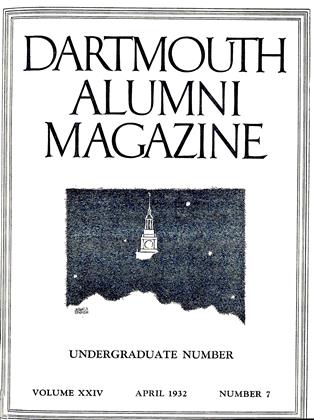By John Newbold Hough '27. Lancaster, Pennsylvania: Lancaster Press, 1931. 109 pages.
The technical classical journal is the fitting medium for a review of Dr. Hough's book, not an alumni magazine. And only a few of the readers of a classical periodical would have the data necessary for a critical appreciation of so highly specialized a monograph. At the same time, the author is so intimately a member of the Dartmouth circle,—son of former Judge C. M. Hough '79, for two years Tucker Fellow in Classics, and for one year a member of the Dartmouth faculty—that many alumni will be interested in a statement of the problem with which Dr. Hough is dealing and an estimate of his results. The brochure is a doctoral dissertation and bears the imprimatur of Princeton University.
Probably 110 alumnus has ever succeeded in passing through college without hearing some disquisition on literary sources, whether in regard to Shakespeare, to Moliere, or to Goethe. So, too, in the field of ancient comedy, literary criticism busies itself with sources. But there is this difference: in the modern field, if the analyst wishes to find elements of L'Ecole des Maris in the Adelphi, or of The Taming of the Shrew in Ariosto ISuppositi, or of Goethe's Faust in the play of Marlowe or in the centuries' reworking of the theme, he has source and derivative in physical form before him. In the case of the plays of Plautus, on the other hand, the sources of which are largely in the writings of Greek New Comedy, the models for comparison have perished and the critic must simultaneously reconstruct the source from which the Roman play came and the relations of the Roman play to that original, all from the material in the derivative play. That much Schoolmen's ingenuity would be lavished on so subtle a process might be assumed, and is, indeed, true.
In the Pseudolus of Platus there are certain inconsistencies of plot and of statement. Scholars have variously condoned these inconsistencies or explained them on the basis of retractatio and contaminatio. "In productions of Plautine plays subsequent to their original presentation, actors and managers only too frequently changed and substituted lines, passages, and even whole scenes." This is retractatio. "Another cause of difficulties, contaminatio, may be defined as the blending, by Plautus himself, of parts taken from two or more Greek plays; sometimes Plautus may even have added parts of a Latin play." Dr. Hough takes up particularly the latter of these, i.e., contaminatio, as it has been discussed by predecessors in respect to the Pseudolus. He complains that previous commentators had confined their studies too closely to the play before them instead of intrepreting the one in the light of the many. A careful application of a comparative method, he believes, keeping in view the normal Plautine technique as found in all the twenty-one comedies, would lead to conclusions which might win more general assent. This method he has followed in his study.
The next section contains a careful critique of the earlier work on the Pseudolus, sifting out what he will accept and what he is compelled to reject. The last chapter carefully analyzes the plot and the implications of its details and develops support for the author's thesis. He concludes that the Pseudolus is "contaminated" from two Greek plays, which are in some respects quite different, and he shows what Plautus has drawn from the one, what from the other, and the means by which he has woven them into the argument of the Pseudolus as it has come down to us.
While this short statement of purpose and method is all that is desirable here, tribute should be paid in closing to the author's comprehensive knowledge of Roman comedy and of the scholars' battles which have raged about it, to his painstaking clarity of exposition, and to his restraint in claiming conclusive proof in a field where so much must always depend upon subjective considerations.
 View Full Issue
View Full Issue
More From This Issue
-
 Article
ArticleAn Undergraduate Looks at His College
April 1932 By Howland H. Sargeant '32 -
 Article
Article"Wildcatter"—A Play in One Act
April 1932 By James W. Riley '32 -
 Class Notes
Class NotesCLASS OF 1910
April 1932 By Harold P. Hinman -
 Class Notes
Class NotesCLASS OF 1928
April 1932 By Leroy C. Milliken -
 Class Notes
Class NotesCLASS OF 1926
April 1932 By J. Branton Wallace -
 Article
ArticleThe Value of Fraternities to the College
April 1932 By Robert Coltman '32
Wm. Stuart Messer
-
 Books
BooksMAGIC SPADES
FEBRUARY 1930 By Wm. Stuart Messer -
 Books
BooksTHE CULTS OF ARICIA.
February 1935 By Wm. Stuart Messer -
 Books
BooksAN ECONOMIC SURVEY OF ANCIENT ROME
November 1938 By Wm. Stuart Messer -
 Article
ArticleDartmouth Again Faces A World Crisis
October 1941 By WM. STUART MESSER -
 Books
BooksTHEMES IN GREEK AND LATIN EPITAPHS
November 1942 By Wm. Stuart Messer -
 Article
ArticleHARRY EDWIN BURTON
May 1945 By WM. STUART MESSER
Books
-
 Books
BooksProfessor William J. Rose
MARCH 1930 -
 Books
BooksFaculty Publications
December 1935 -
 Books
BooksEMERSON: THE ENRAPTURED YANKEE
AUGUST 1930 By Harold Blodgett -
 Books
BooksShips Underseas
May 1975 By LOUIS MORJON -
 Books
BooksPIERRE-SIMON BALLANCHE:
August 1946 By MARIE-LOUISE MICHAUD HALL -
 Books
BooksTHE GREAT POETS AND THE MEANING OF LIFE.
June 1937 By W. K. Stewart

